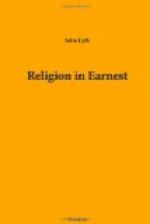The most important memorandum is a collection of rules for the regulation of her own conduct, adopted about the year 1805; and these, we do not hesitate to add, were written not merely with pen and ink, but impressed by the Spirit of God upon her memory and heart, for those who knew her will be able to recognize in them the key of her after life. They are as follow:—
“1. Let me rise early.
2. Never let me trifle with a book with which I have no present concern; in applying myself to any book, let me endeavour to recollect what I may learn by it, and then beg suitable assistance from God.
3. Never let me lose one minute of time, nor incur any unnecessary expense, that I may have the more to spend for God. When I am abroad let me be desirous of doing good; let me have in readiness some subject of contemplation and endeavour to improve my time as I go along.
4. Let me endeavour to render myself agreeable and useful to all around me; by a tender compassionate friendly behaviour; avoiding all trifling and impertinent stories; remembering that imprudence is sin.
5. Never let me delay anything, unless I can prove that another time will be more fit than the present; or that some more important duty requires my immediate attention.
6. O may I never enter into any long schemes about future events, but in general refer myself to God’s care.
Direct me virtue’s happy course
to run,
And let me be instructed by thy Son,
In every station say “thy will be
done.”
7. O that I may be delivered from the least inclination to judge my neighbours; and that henceforth I may find fault with none so much as myself.”
To these are added several extracts from the general rules of the Methodist Societies; particularly those which refer to the use of time, the government of the tongue, reading the Scriptures, private prayer, and abstinence.
The standard of Christian character at which she aimed was high; and perhaps this very circumstance contributed to delay the happy experience she sought. She looked at herself instead of looking directly to Christ. She contrasted her own deficiencies with the exact obedience required by a perfect law, instead of simply casting herself upon the blood which justifieth not the righteous but the sinner, which believeth in Jesus. The simplicity of salvation by faith was long overlooked, but at last the snare was broken; and about the close of the year 1805 she obtained the deliverance she so earnestly desired. We here quote her own words.




